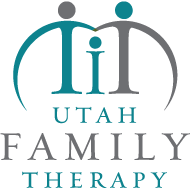ACT Therapy: Enhancing Mental Health with Utah Family Therapy
Acceptance and Commitment Therapy (ACT) in mental health treatment, is an approach that effectively addresses the complexity of human emotions and behaviors.
Within the framework of Utah Family Therapy, ACT serves as a cornerstone in its comprehensive array of modalities for enhancing mental health.
In this article, we’re going to delve into what ACT Therapy entails, its applications within Utah Family Therapy’s intensive outpatient program, and its integration into individual and family therapy sessions.
Quick Links

Understanding ACT Therapy
Acceptance and Commitment Therapy (ACT) is a form of psychotherapy that blends mindfulness strategies with acceptance and behavior change principles.
Developed in the late 20th century by Steven C. Hayes and his colleagues, ACT aims to help individuals establish psychological flexibility by accepting what is out of their control and committing to actions that enrich their lives.
ACT Core Fundamentals
At its core, ACT operates on six fundamental principles:
- Cognitive Defusion: Encouraging individuals to step back from their thoughts and see them as mental events rather than absolute truths.
- Acceptance: Embrace difficult emotions and experiences instead of avoiding or suppressing them.
- Contact with the Present Moment: Fostering mindfulness to enhance awareness of the present moment, similar to DBT and CBT.
- Self-as-Context: Cultivating a sense of self that is separate from one’s thoughts and emotions, promoting a more stable identity.
- Values Clarification: Identifying and using personal values to guide decision-making and behavior.
- Committed Action: Setting goals aligned with one’s values and taking meaningful steps towards them despite potential obstacles.
How Acceptance and Commitment Therapy is Integrated into Utah Family Therapy
Utah Family Therapy recognizes the profound impact that ACT can have on individuals and families grappling with various mental health challenges.
Within their intensive outpatient program (IOP), ACT is a fundamental component in promoting lasting recovery and well-being.
Group Therapy Sessions
In an IOP setting, group therapy sessions provide a compassionate environment for individuals to share and explore their thoughts, emotions, and behaviors.
ACT techniques such as mindfulness exercises, cognitive defusion strategies, and values clarification activities are integrated into these sessions.
Participants learn to observe their internal experiences without judgment, fostering greater self-awareness and emotional regulation.
Individual Therapy
In one-on-one therapy sessions, clients work closely with trained therapists to apply ACT principles to their unique circumstances.
Therapists help clients identify unhelpful thought patterns, challenge rigid beliefs, and develop more flexible ways of thinking.
Through guided mindfulness practices and experiential exercises, individuals learn to cultivate acceptance and compassion towards themselves and others.
Family Therapy
Acceptance and Commitment Therapy is not limited to individual therapy but extends to family dynamics.
Family therapy sessions at Utah Family Therapy emphasize open communication, understanding, and acceptance of each member’s experiences.
Therapists facilitate healing and strengthen familial bonds by incorporating ACT principles into family sessions.
Families learn to navigate conflicts with greater empathy and cooperation, fostering a supportive environment conducive to growth and resilience.
The Benefits of ACT Therapy
Utah Family Therapy’s integration of ACT Therapy yields numerous benefits for clients participating in their intensive outpatient program and individual/family therapy sessions:
- Enhanced Emotional Regulation: Individuals develop greater emotional resilience and regulation skills by learning to accept and observe their emotions without judgment.
- Improved Interpersonal Relationships: ACT fosters empathy, compassion, and effective communication, enhancing relationships both within the family unit and in broader social contexts.
- Increased Psychological Flexibility: Clients cultivate the ability to adapt to life’s challenges with greater ease, navigating setbacks and uncertainties with resilience and determination.
- Alignment with Personal Values: Through values clarification exercises, individuals gain clarity about what matters to them, continuously guiding decisions and actions towards a more meaningful and fulfilling life.
Conclusion
Acceptance and Commitment Therapy (ACT) is another cornerstone of Utah Family Therapy’s comprehensive approach to mental health treatment.
By integrating ACT principles into their intensive outpatient program and individual/family therapy sessions, Utah Family Therapy empowers clients to cultivate greater psychological flexibility, resilience, and well-being.
As clients navigate the complexities of mental health challenges, individuals and families find support, healing, and hope in the transformative power of ACT Therapy.
Action Items
For individuals seeking Acceptance and Commitment Therapy (ACT) as a therapeutic approach to address their mental health concerns, here are actionable steps to guide you in finding appropriate resources and beginning your journey toward psychological well-being:
Research and Understand ACT Therapy
- Learn about ACT: Take the time to research and understand the principles and techniques of Acceptance and Commitment Therapy. Resources like books, articles, and online courses can provide valuable insights into how ACT works and its potential benefits.
- Explore Case Studies and Testimonials: Seek out stories and testimonials from individuals who have undergone ACT therapy to see experiences you might relate to. Understanding real-life experiences can help gauge whether ACT aligns with your goals and needs.
Find Qualified Therapists
- Search for ACT Therapists: Look for therapists in your area specializing in Acceptance and Commitment Therapy. Online directories, professional associations, and mental health websites often provide search tools to help you find qualified therapists who offer ACT.
- Verify Credentials: Ensure that therapists are licensed mental health professionals and understand ACT or have gone through specific training in ACT. Learn about their approach to therapy and verify their credentials.
Assess Fit and Compatibility
- Schedule Consultations: Reach out to potential therapists to discuss your concerns and treatment goals. Use this opportunity to assess the therapist’s approach, communication style, and overall fit with your personality and preferences.
- Ask Relevant Questions: Prepare a list of all of your questions to ask during the consultation, focusing on how the therapist integrates ACT principles into their practice, their experience working with similar issues, and their approach to collaborative goal-setting.
Establish Treatment Goals
- Identify Personal Values: Reflect on your core values and aspirations, considering what matters most. Clarifying your values can guide the goal-setting process and inform the direction of your therapy journey.
- Set Specific Goals: Work with your therapist to establish simple, achievable goals that align with your values and address your mental health concerns. Break down larger goals into smaller, simple, and actionable steps to track progress over time.
Engage in Therapy
- Attend Regular Sessions: Commit to attending therapy sessions consistently and actively participating in the therapeutic process. Use each session to explore thoughts, emotions, and behaviors, applying ACT principles to promote self-awareness and growth.
- Practice Daily Mindfulness: Incorporate mindfulness into your life, such as meditation, deep breathing exercises, or mindful awareness of daily activities. Cultivating mindfulness can enhance your ability to observe thoughts and emotions without judgment, a core aspect of ACT.
Apply Techniques Outside of Therapy
- Implement Homework Assignments: Complete any homework assignments or experiential exercises assigned by your therapist between sessions to reinforce learning and promote the integration of ACT principles into your daily life.
- Practice Psychological Flexibility: Apply ACT techniques such as cognitive defusion, acceptance, and committed action in various life situations. Practice responding to challenges with openness, flexibility, and resilience, using your values as a guide.
Monitor Progress and Adjust
- Track Progress: Every day or at least weekly, monitor your progress toward your treatment goals, noting any changes in thoughts, emotions, or behaviors. Use outcome measures or journaling to track your experiences and insights throughout therapy.
- Communicate with Your Therapist: Maintain open communication with your therapist, sharing feedback about your experiences and discussing any concerns or challenges. Collaborate with your therapist to make adjustments to your treatment plan as needed.
By following these action items, individuals seeking Acceptance and Commitment Therapy (ACT) can take proactive steps toward finding qualified therapists, setting meaningful treatment goals, and actively engaging in the therapeutic process to promote psychological well-being and personal growth.
